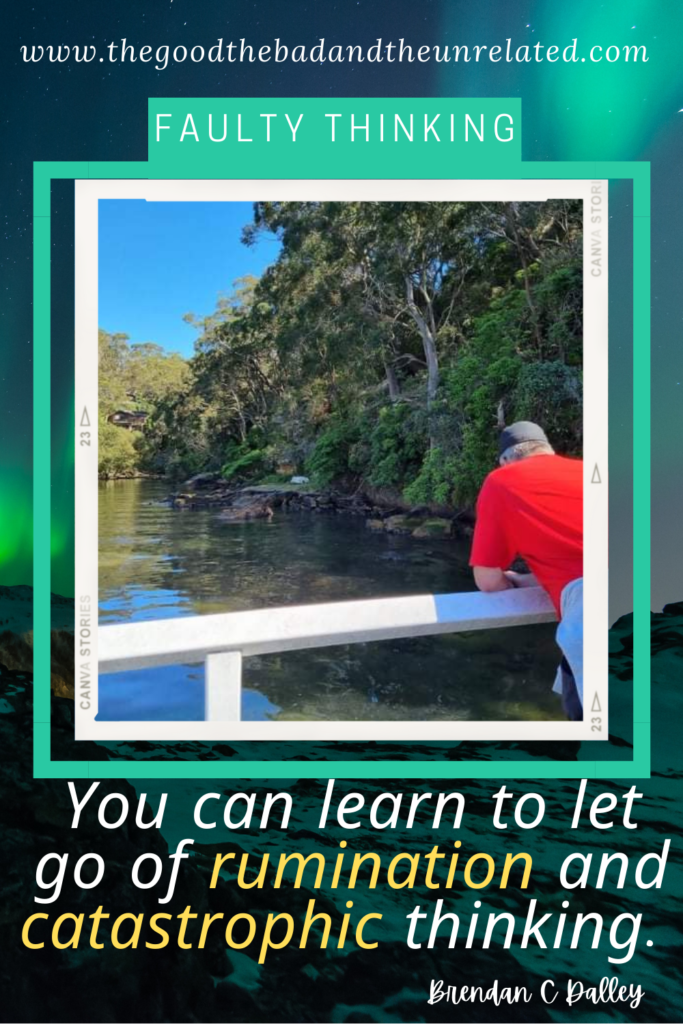The road never takes you where you expect it to. A new pathway never quite leads where you think it will, no matter how much experience you have. You can plan and predict the destination and the outcome, but in the end something is always different to the vision in your mind. Maybe the destination isn’t quite what you imagined. Maybe your fellow travelers have changed or the outcome had unintended consequences. Why then, do we insist on ruminating and catastrophising life so much, if everything usually ends differently to what we expect anyway? You’d think we’d learn.
Rumination
Rumination is a deep, repetitive and considered thought process about something. On the surface, that sounds like a positive thing, and in many cases it is. The problem with rumination is that it is too repetitive and not so easily switched off. The vulnerable mind believes that if there is a problem, it can worry that problem away. It then sets about turning that problem over in the mind in the hope of finding a solution. When a solution is not forthcoming, it starts the whole process over again. This is a distinct problem, because in many cases, after planning is complete, action or patience is needed, not further rumination.
Catastrophisation
Catastrophising is a close relative of rumination. As the root word indicates, catastrophising is when the mind sees catastrophe at every turn. Whatever happens, the mind believes the absolute worst outcome will eventuate in any significant circumstance. Ideas around failure, injury, rejection, poverty and loss are common fears of a catstrophising mind, even though reality is rarely that bad.
Imagine a person that suffers from too much of both of these thinking errors. Every significant issue that presents itself or has occurred in the past, has to be examined, stressed over and analysed ad infinitum. The fear of a possible catastrophic outcome is as real as the ground they stand on. No wonder these thinking errors are so common in our anxiety riddled, increasingly depressed society.
They seemed so helpful…
To many of us, rumination and catastrophisation are appealing. They give us the false sense that by holding an issue firmly at the front of our mind, we can overcome it, or at last out think it. Unfortunately, nothing could be further from the truth. By constantly turning an issue over in our mind, we are fearing the consequences of something that has not happened yet and probably won’t happen the way we imagine at all. Not only this, but we will be naturally less effective in the present moment because our mind is elsewhere.
Rumination over past events robs us of the present moment by focussing on a history that can’t be changed.
Catastrophising future events robs us of the present moment by focussing on something that hasn’t happened yet.
The solution: The present moment
Learning to be more fully in the present moment is the solution to these giant thinking errors. If we are able to engage fully with what is happening as we breathe, then rumination and catastrophising have great difficulty gaining a foothold in our brain. This sounds deceptively simple. Some doubters might even indicate that it is like saying ‘‘The solution to war is peace’. Correct on the surface, but essentially impossible.
The good news is that it is possible to be more fully in the present moment. The hard work in figuring out how, has been done for us by others. Meditation and mindfulness teach us breathing techniques and skills to focus, let go and rest our minds in the moment. Cognitive Behaviour Therapy CBT teaches us to recognise faulty thinking and challenge it through simple and highly effective exercises. Acceptance and Commitment Therapy ACT teaches us to focus on our important values and to accept our situation as it is.
The Psychologist
You can, of course, learn these skills through research and reading. I will provide a few recommendations at the conclusion of this post for those who are inclined. Having a professionally trained Psychologist to guide and teach you these skills, though, is the best outcome. Psychologists are impartial to our private lives and can assist us more objectively than we can ourselves. Our own minds cannot always be trusted when we are struggling.
Seek guidance. Take it from someone who has lost too many years to ruminating and catastrophising. If these thinking errors are left unchecked, they mark a slippery slope to anxiety and depression. You don’t have to keep doing this. You can break free of the prison of unchecked thoughts. The present moment is a much better place to be.
Links
Perception -Thinking errors. » The Good The Bad and The Unrelated
What is Catastrophizing? Cognitive Distortions | Psychology Today-3
Rumination: A Problem in Anxiety and Depression | Psychology Today



Great reading. Very well put food for thought
Thanks, Marg. I appreciate your comment.
Nice high tide photo 🙂 Getting past the 2 thinking errors is one of slowly building trust and from my experience avoiding unreasonable people (or work places). Surround yourself with trustworthy people who don’t judge.
So true. I walk with a trustworthy fellow every Saturday.
Thanks for the great summary and insight into rumination and catastrophizing. I am curious as to what your thoughts are regarding DBT, accepting the situation as it is, and at the same taking action towards an outcome we would like to create, as a way to move past either or both of these thought patterns?
Thankyou for your kind words. I’m glad that my summary was useful. Acceptance was a huge part of my own journey and CBT was instrumental in teaching me the skills I needed to challenge my negative thought patterns. I found the focus on Values rather than outward success in Acceptance and Commitment Therapy (ACT) nreally helped too. I come to this as a layman and not a Psychologist, so my observations are what worked for me. That said, the statistics on DBT are clear, it can really work. Thanks again for your encouragement.
Hey Brendan, Nice to catch you on here and I love what you are doing, both for yourself and for others by having this Blog. I was hopeful however that you and your contributors might see your way clear to not use the common medical acronyms as us newbies to the site don’t know what they stand for, and it’s not always apparent by the context of the discussion being had. For example the one above discusses DBT and CBT. Are you both discussing the same thing but with different outcomes or symptoms? Or are these two very different ailments?
Anyway, just hoping my constructive is taken the right way and that I haven’t caused a huge outcry over the simplest issue I see here. Yours in Christ.
GB
DBT or Dialectical Behaviour Therapy is a modified type of CBT or Cognitive Behaviour Therapy that focusses on accdepting your situation and learning to live well in each moment. They are fantastic, evidence based therapies that teach you coping skills and help you to be in each moment rather than ruminating or catastrophising.